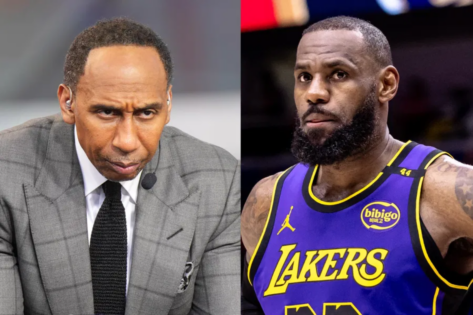It takes a special kind of spectacle to break through a man’s vacation in Vietnam.
No, not a collapsing government. Not a volcanic eruption. Then, what made it across Bomani Jones, a former ESPN colleague of SAS’s news radar, while abroad? A beef between a media titan and a basketball icon. Two names that don’t share a jersey, but somehow share headlines. Yup! I am talking about Stephen A. Smith’s very public spat with LeBron James. Just so that you know, the other headline that made it to Jones’ feed was Donald Trump’s latest encrypted messaging scandal. Now, back to Bron-SAS.
The feud didn’t just spring from thin air. Of course not! Smith’s sharp critique of LeBron’s son, Bronny, fired up a courtside confrontation that spilled into the public eye. The Lakers superstar made it clear he wasn’t having it, calling out the face of ESPN for crossing a line. Their back-and-forth wasn’t just about basketball.
It rather became a flashpoint in the ongoing debate over media boundaries and respect. For a commentator who built his empire on unfiltered takes, this was a rare moment when the players pushed back. And the drama only added to Stephen A.’s cultural reputation, for better or worse. But amid the noise, something more revealing bubbled up.
“The 20-years-ago version of Stephen A. Smith was a lot bolder, a lot brasher, and I think even he would acknowledge a bit more insufferable,” Jones said to Matt Flegenheimer of The New York Times. “The game beat him down.”
And getting beaten down also had a name, courtesy of LeBron James. “Stephen A. Swift”—the LeBron loyalists quickly cooked that up as the ‘Akron Hammer’ took it all the way to the end, promptly imagining Stephen A. cuddled with an ice-cream “in his tighty-whities on the couch,” absolutely happy that the feud was still the top headline. The ‘Swiftie’ for his part, had a few things (obviously) to say.
First off, he cleared up that he “don’t wear tighty-whities — let you figure out why that is.” Secondly … well, that didn’t go so well. The 57-year-old ended up wrongly accusing James of skipping Kobe’s memorial in 2020—a deeply sensitive accusation. The reality? James was there. Both The Los Angeles Times and The Washington Post confirmed the Lakers star attended but had asked not to be filmed out of respect for the Bryant family. In fact, the man even speculated that the whole thing affected Bron so much, probably because Smith always believed that “Mr. James was no Michael Jordan.” Interestingly enough, Jones had a very intriguing take.
Bomani, more than acknowledging the moment, diagnosed it. “He is more famous than 98 percent of the people that he covers,” he said. “When you work at ESPN, men in this country know who you are.” The takeaway? Stephen A. isn’t just covering culture. He’s become it. But what happens when the culture he helped shape starts turning on him? And here’s the thing: Jones knows that stage all too well. His own ESPN journey was a masterclass in principled disruption.
From Highly Questionable to High Noon to The Right Time, Jones carved a space for thoughtful, often uncomfortable conversations around race, power, and sports. But that clarity came at a cost. His 2016 appearance in a “Caucasians” T-shirt—mocking the Cleveland Indians’ Chief Wahoo logo—sparked a media firestorm and signaled his willingness to take risks that the network sometimes preferred to sidestep.
Despite hosting one of ESPN’s top-rated podcasts, Jones’s contract wasn’t renewed in 2023. His HBO show Game Theory also came and went. So when he says, “The game beat him down,” he’s not speaking as some distant media critic. He’s lived the game. Which makes his perspective on Smith not just informed, but lived-in.
Has the game really “beat down” Stephen A. Smith, or is this just a cover-up for his behaviour now?
Lately, Smith has had something else weighing on his mind: himself. “Let me switch to a subject near and dear to my heart,” he said on his podcast recently. “Me.”
This isn’t a detour from the usual. It’s the brand. Stephen A. Smith, 57, is ESPN’s $100 million megaphone—an omnipresent force in sports media who can add heated debate into the most mundane game notes. He’s a first-person thinker (“When I think about me…”), a third-person talker (“Stephen A. Smith is in the news”), and occasionally both at the same time. His memoir puts it plainly: “Calling things like I see them,” he wrote, “is who Stephen A. Smith has been my entire life.”
In a way, his hyper-self-awareness has become its own performance. There’s always been a meta element to Smith’s presence because more than commenting on the moment, he’s commenting on… his own commentary. That self-referential loop used to feel radical. Now? It’s routine. And you can see it. Literally.
The ESPN “First Take” cameras wait on Smith’s face in silence, capturing his reaction like a political analyst on election night. “Stephen A. aghast. Stephen A. amused. Stephen A. disappointed“. It’s not just commentary, it has now become a classic performance art.
The Knicks seem to agree. After New York steamrolled Boston 119-81 in Game 6 to advance to their first Eastern Conference Finals in 25 years, several Knicks players went out of their way to ice out Smith. Why? Because he picked the Celtics. “I have nothing to say to you,” Jalen Brunson reportedly told him post-game. Karl-Anthony Towns added, “You picked the wrong team.”
Ouch. When the hometown team you’ve historically supported wants nothing to do with you, something’s shifted. And not in your favor. But to be fair, Stephen A. Smith defended his flip-flop. He explained on-air that he changed his pick mid-series once the Knicks showed signs of dominance. It wasn’t personal, just professional pivoting. Still, the backlash hit.
Even former Knick John Starks chimed in, saying Smith should’ve stood by his original stance. Because at this point, critics argue again, Smith isn’t reacting to the game—he’s reacting to how he’ll look reacting to the game. This is where things get murky. Because when you’re both the megaphone and the message, authenticity becomes a tightrope walk. There’s no shortage of pundits on TV, but Stephen A. was never just another suit behind a desk—he was ESPN’s voice of unfiltered conviction. Now, he sometimes feels like a brand protecting its equity. Oh man, that is hurtful.
And therein lies the dilemma. In becoming more aware of his own celebrity, has Stephen A. lost the very thing that made him essential? Some might say he’s adapting to a developing media climate. Others, like Jones, suggest he’s been diluted by it. “The game beat him down,” he had said, not with ratings or rivals, but with relevance fatigue. So, where does this leave the face of ESPN?
Stephen A. Smith is still the loudest voice in the room. But now, more than ever, the room is questioning what he’s actually saying. And maybe that’s the real controversy here—not just who Stephen A. is feuding with, but whether Stephen A. still feels like Stephen A. Because once the theater masks come off, we’re all wondering the same thing: Has the showman lost his show?
The post Ex-ESPN Colleague Claims Stephen A. Smith Has Become Weaker Amid Latest NBA Controversy appeared first on EssentiallySports.



